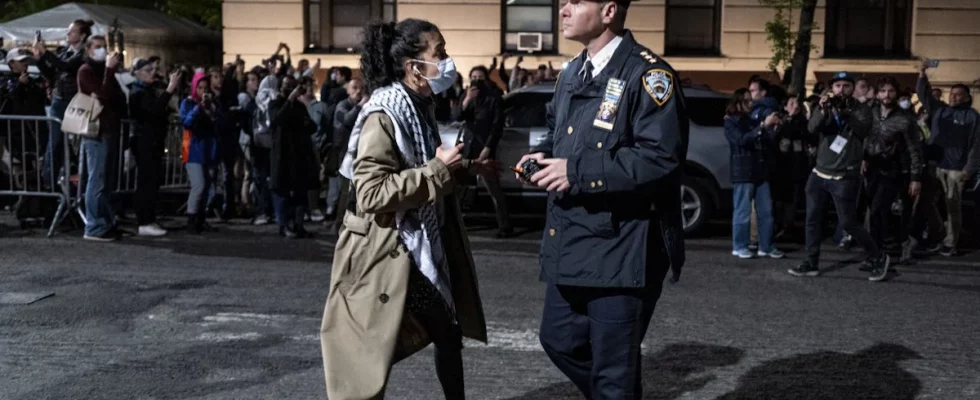Joe Biden was unlikely to have long hair in 1968, when Hamilton Hall at Columbia University in New York became the scene of anti-war protests that would permanently change the course of history and society. The current US President once said that tie-dye T-shirts weren’t his thing either. “I studied law. I wore jackets.”
Exactly 56 years to the day after the violent eviction in 1968, the New York police broke into Hamilton Hall again on Wednesday night. This time not through underground tunnels, but via a ladder and a window. A group of students occupied the building on Tuesday to demonstrate against Israel’s actions in the Gaza war.
The police arrested around 50 people and also cleared the protest camp that was set up on the Manhattan campus two weeks ago. Similar scenes took place at other universities across the country, as far away as Los Angeles. There, the university called the police for help after pro-Palestinian and pro-Israel groups clashed.
It was the domestic counterpart to US Secretary of State Antony Blinken’s efforts to calm the war in the Middle East. During a three-day tour, he called on the terrorist group Hamas to quickly accept an offer from Israel to release 33 hostages in Gaza. In Tel Aviv on Wednesday, he urged Prime Minister Benjamin Netanyahu to refrain from attacking Rafah, the city in southern Gaza.

A ceasefire should prepare the ground for the longer-term peace in the region, which Blinken had previously promoted in Saudi Arabia. The big goal is to normalize relations between the kingdom and Israel and to develop a perspective for a Palestinian state. In return, Saudi Arabia would receive a security agreement with the USA and access to civilian nuclear technology.
Joe Biden also has the greatest interest in calming the war domestically. The US President is unlikely to be able to stay away from the events as a spectator, as he did in 1968 New York Times stated on Tuesday. It is not yet possible to estimate whether the universities’ repressive strategy will work. Exams and graduation ceremonies will now take place, secured in the case of Columbia by the New York police, who will remain stationed on the site until mid-May. Afterwards, summer drowsiness is likely to settle over the campus.
Protests are being planned for the Democratic Party conference in the summer
But the organizations behind the demonstrations are already doing everything they can to get the protests to flare up again in the fall. They are trying to mobilize for the Democratic Party Convention in Chicago in mid-August, when Joe Biden wants to be officially named presidential candidate. Here too, 1968 serves as a model, when the convention in Chicago degenerated into street battles and plunged the party into chaos. At that time, however, the tension in the USA was much higher than it is today. The Vietnam War divided the Democrats as much as the demands for equal rights for African Americans, whose leader Martin Luther King was assassinated in the spring.
The wave of protests against the war in Gaza could still prove decisive for Joe Biden and his ambitions for a second term in office. In 2020, he benefited from the fact that a large majority of younger groups of voters rallied behind him to drive Donald Trump from the White House. This time, Biden is still in the lead in polls among people under 30 – although by no means by an overwhelming margin. In an election that is likely to end with an extremely close result, Biden cannot afford such losses.
Israel’s actions in the war have met with broader criticism in the USA, and many Americans expect the president to put more pressure on Israeli Prime Minister Benjamin Netanyahu. However, anti-Semitic slogans were heard during the protests, demonstrators demanded that schools stop academic cooperation with Israel and that foundations sell Israeli assets. There are no majorities among the American electorate with such extreme demands. Joe Biden is therefore likely to continue pursuing his pragmatic course. He will support Israel, but will also harshly criticize its prime minister when necessary. In the hope of helping to resolve the conflict – or at least to ensure that foreign policy ultimately plays the usual role in the presidential election: a subordinate one.

